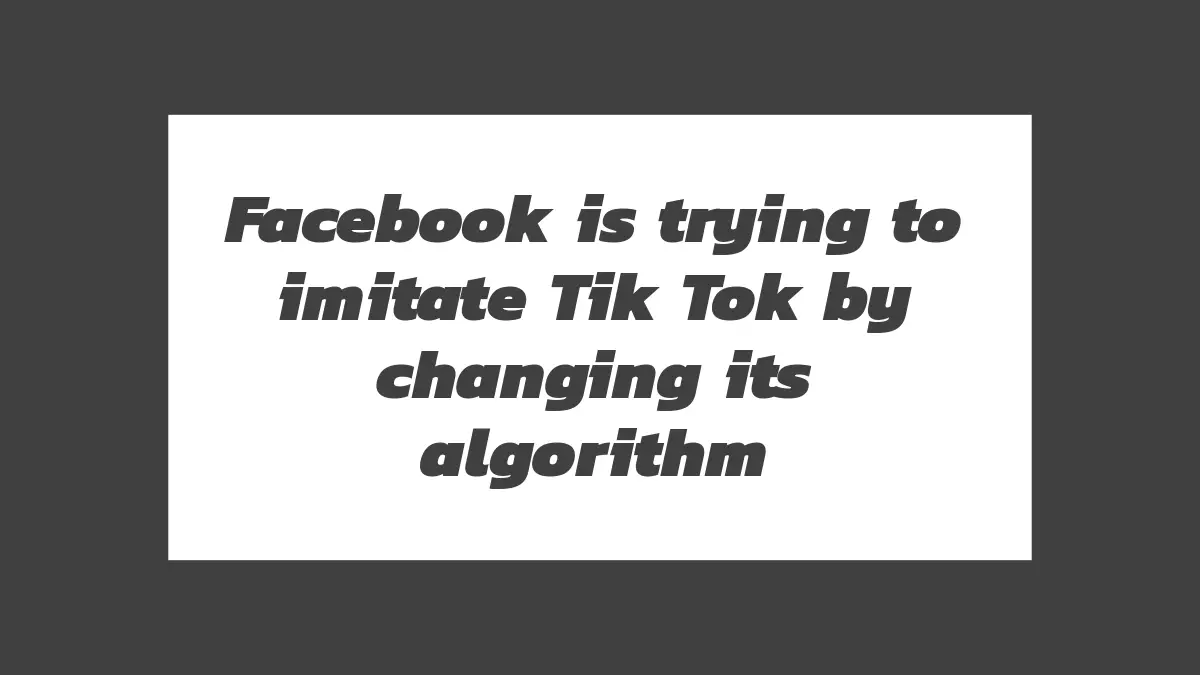In recent years, TikTok has emerged as one of the most popular social media platforms, captivating users with its short-form, creative videos. Its algorithm, which curates content based on user preferences and trends, has played a significant role in its success. Recognizing the growing influence of TikTok and its algorithm, Facebook has made efforts to replicate its appeal by modifying its own algorithm.
Facebook, being one of the largest social media platforms in the world, is constantly adapting to changing trends and user demands. In an attempt to capture the attention of TikTok’s young and engaged audience, Facebook has been working on refining its algorithm to prioritize short-form videos and increase their visibility on its platform.
The primary focus of Facebook’s algorithm changes is to ensure that users are presented with engaging and relevant short videos, similar to the TikTok experience. By adjusting the algorithm, Facebook aims to surface more video content that aligns with users’ preferences and interests, creating a personalized and immersive experience.
One of the key aspects of TikTok’s algorithm is its ability to analyze user behavior and provide content recommendations accordingly. Facebook has taken note of this and has started implementing similar techniques. By leveraging machine learning and artificial intelligence, Facebook aims to understand user preferences and tailor the content feed to suit individual interests. This includes analyzing factors such as viewing duration, engagement metrics, and content interactions to curate a personalized video feed for each user.
Another feature that Facebook has introduced to enhance its short-form video experience is the “Sound Collection.” This feature allows users to add popular and trending soundtracks to their videos, similar to TikTok’s extensive library of music. By incorporating a wide range of sound options, Facebook aims to provide creators with more tools to make their videos engaging and entertaining.
In addition to algorithmic changes, Facebook has also introduced new features to compete with TikTok’s creative offerings. One such feature is “Reels,” which allows users to create and share short videos with creative effects and filters. This feature is integrated into the Facebook app and provides users with a platform to showcase their talent and creativity in a TikTok-like format.
Furthermore, Facebook has made efforts to promote its short-form video content through cross-platform integration. For instance, Instagram, which is owned by Facebook, has introduced “Instagram Reels,” a feature that directly competes with TikTok. Instagram Reels enables users to create and share short videos with a wide range of editing tools and effects. By incorporating Reels into Instagram, Facebook aims to leverage its existing user base and encourage creators to migrate from TikTok to its platforms.
While Facebook’s attempts to emulate TikTok’s success are evident, it’s important to note that the two platforms have their own unique characteristics and user bases. TikTok’s rapid rise in popularity can be attributed to its distinct features, innovative content creation tools, and its ability to cultivate a strong sense of community. While Facebook’s algorithm changes and introduction of new features are aimed at capturing some of TikTok’s success, it remains to be seen whether they can fully replicate the appeal and engagement of the TikTok platform.
Moreover, competition in the social media landscape is fierce, with several platforms vying for users’ attention and content creators. TikTok’s dominance in the short-form video space has prompted other social media giants to adapt and innovate to stay relevant. By modifying its algorithm and introducing features like Reels and Sound Collection, Facebook hopes to attract both users and creators who are looking for an alternative platform to showcase their creativity and engage with a wider audience.
In conclusion, Facebook’s attempt to emulate TikTok’s success through algorithm changes and the introduction of new features reflects the dynamic nature of the social media landscape. By prioritizing short-form video content and implementing machine learning algorithms, Facebook aims to create a personalized and engaging experience for its users.




